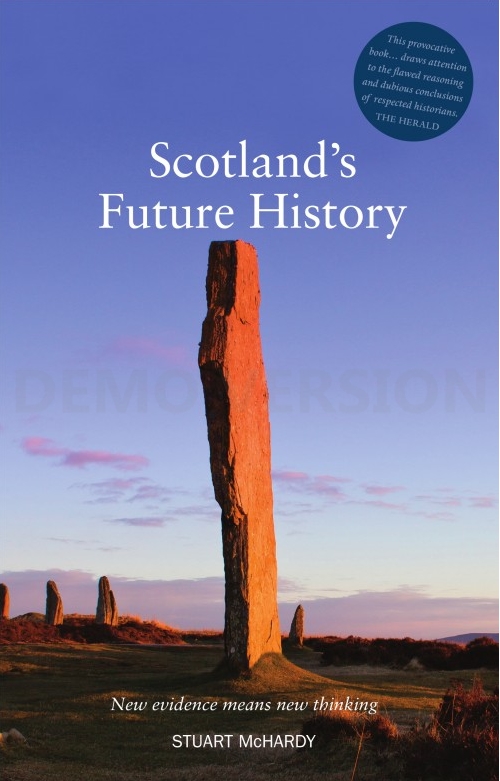Warning: Undefined array key "ssba_bar_buttons" in /usr/home/movgwifi/public_html/yesedinburghwest.info/wp-content/plugins/simple-share-buttons-adder/php/class-buttons.php on line 602
Warning: Undefined array key "ssba_bar_buttons" in /usr/home/movgwifi/public_html/yesedinburghwest.info/wp-content/plugins/simple-share-buttons-adder/php/class-buttons.php on line 602
Warning: Undefined array key "ssba_bar_buttons" in /usr/home/movgwifi/public_html/yesedinburghwest.info/wp-content/plugins/simple-share-buttons-adder/php/class-buttons.php on line 602
Please buy the book her e.
e.
The past does not dictate the future, or even the present. Stuart McHardy has written this provocative book to challenge long-held “received opinion” about Scottish history – frequently perpetuated, he says, by historians with a tendency to revere the Roman Empire out of all proportion (and by those who emerged as the victors in any period). McHardy is open about his own biases and knows that some of what he asserts is merely informed speculation, but he does also draw attention to the flawed reasoning and dubious conclusions of respected historians which have nevertheless been generally accepted. As he says, ‘all historians are propagandists… this one included’. This is not a history book, but a possible new approach to Scotland’s history.
The Far Past: Received opinion has it that civilisation began in the Mediterranean and spread outwards from there, but evidence being gathered from Neolithic sites around Scotland (such as Ness of Brodgar), which predate Stonehenge and the Pyramids, are weakening that position. What if megalithic culture spread from north to south? What if prehistoric Scotland was not some dark, remote land populated by barbarians, but was actually home to a highly sophisticated civilisation? Caesar said the Gaulish druids went to Britain for training – did they actually go to north and west Scotland?
An Indigenous mythology: Can we trace our pagan myths back to a primal religion of a Mother Goddess?
Between the walls: Received opinion is that Scotland was part of the Roman Empire. How factual is Tacitus’ Roman history? Most archaeology has been on Roman sites, to the detriment of older sites, yet Mons Graupius has never been found. Did the Romans actually get above the Antonine Wall or conquer Scotland?
Spinning the Scots: Did the Scots come from Ireland, or were they an indigenous tribe? There is little basis for an Irish migration in fact. Was Columba a thief who was exiled? Were the Scottish clans far more egalitarian (they picked their own chiefs) and autonomous than they are generally portrayed?
What War of Independence? Why are the Wars of Independence so named when Scotland was already independent and not thought of as part of England? Edward I tried to use feudalism to take over Scotland.
What’s in a name? Does McHardy suggest Irish or Norman ancestry? Was there really a Norman invasion of Scotland at the time of David I? Have our aristocrats fabricated antique credentials for themselves?
After Charlie left: What if Culloden wasn’t the “final confrontation” of the Jacobite rising? Why did the redcoats garrison the northern part of the then United Kingdom for so long after Culloden?
Thomas Muir of Huntershill, the Radical: Why don’t we know more about Thomas Muir and Fanny Wright, fierce fighters for democratic rights? Have there been attempts to write them out of history?
Stuart McHardy takes a revolutionary approach to interpreting the past. He shows that future generations will understand Scottish history in a fundamentally different light thanks to recent and future developments in archaeology, folklore and oral history. Scotland’s Future History unlocks a vision that is free from the kinds of distortion, bias and error that have plagued our understanding for centuries. Archaeology is key – in Elsrickle, Ness of Brodgar, Warren Field in Crathes, Uamm na Deargan on Scarba – and their links with folklore. Schliemann only found the ancient city of Troy by reading Homer’s “stories”.
The re-writing of history by the Establishment continues to the present day, with the mainstream media opposed to political change, happy to repeat every negative story about Scottish Independence, and broadcasting PR-driven pieces instead of thorough questioning and analysis.
If future generations of Scottish children are to grow up with a decent regard for themselves and a respect for their own culture and history, we must be prepared to face up to the realities of what history has to tell us. It is time we knew ourselves better. It is only since the re-opening of the Scottish Parliament that Scottish history has become part of the Curriculum for Excellence in schools – and this is to be welcomed.
Yes Edinburgh West has a website, Facebook, Twitter, National Yes Registry and a Library of topics on Scottish Politics, including Independence.



